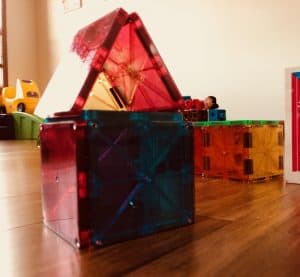
Sign in
Don't have an account with us? Sign up using the form below and get some free bonuses!

I was just waking up and remembered that I needed to move some food from the night before from the refrigerator to the freezer. Upon opening the fridge, I noticed that the lid on the food wasn't secure, so I tried to push it down. In doing so, my Superheroine-Like Muscles (that must be it, right?) managed to push down the entire shelf. Half the food went airborne and the other half, along with the shelf, came crashing down like an avalanche. That's one way to wake me up!
Some of the food flew far enough to land on a Magna-Tiles creation (afflink) that my daughter had made. Now, unlike many kids who assemble and dismantle toys as often as they blink, my child, who's a self-proclaimed engineer, will painstakingly plan and build her creations, adding to them over weeks and months until they're "just right." She develops intricate stories about the imaginary people living in her elaborate villages, and if I didn't know better, I'd think they were really there.
So, when the Food Monsoon came through and damaged her village, she was devastated. 
I was still tired and a bit grouchy. The chaos I'd created before having my morning tea didn't help matters. Rather hastily, I instructed her to back up while I cleaned the mess. I wasn't thinking about the effects on her Magna-Tiles; I just wanted to get the food off the ground as quickly as possible.
Hot on my heels, she followed me to the utility room to get the cleaning supplies. I barely noticed she was there until I heard the distinct sound of a muffled sob. She was trying to let me work, but her sadness was finding its way out.
Only then did I see her. I knelt down despite my frustration and, still in my rational adult brain, I hugged her and told her calmly that I just needed to clean up and then we could get ready for breakfast.
Woah, Nelly. Not so fast.
"But Mommy," she struggled to say through an increasingly reddening face, "What about the family who lived in the house I built?"
Oh, right. The family. There were (imaginary) people in there. Still not "getting it," I replied softly, "Let's make the houses again together as soon as the materials are clean."
I needed to wake up. It wasn't the loss of the houses she was mourning; it was the people. The people she'd imagined; the people she'd grown to love in perfect childlike endearment.
Finally, I got it. I had to get out of my adult brain and address it from the perspective of a five-year-old. I know better than to "solve" problems as I'd been trying in my haste; she needed me to actively listen and to see her.
"I hear you're really concerned about the people," I started, "and you're worried they won't have a place to live."
Cue the big sobs. I'd hit the right nerve. The tears came heavily then and lingered for a long while; her heart weighed down with a child-sized natural disaster. It was completely real to her, as it should be. That's how kids' brains work.
"Yes, Mommy! What will they do?"
Finally connecting as I should have since the beginning, I replied, "I hear your deep concern for the family. You really care about them." Without attempting to solve her problem, I listened. I held her as she mourned and processed her feelings. After she'd allowed her storm to pass, she regained a sense of calm. Rushing her or reassuring her that she was alright (when she didn't feel that way) would've invalidated her experience. Listening empathetically as she worked through her sadness allowed her to build resilience, along with fostering trust in herself that she can get through hard things.**
At this point, still fully entrenched in her imagination and worry, she looked to me for guidance. The best way to connect with her in that moment was to join her right where she was: understanding her imaginary people's needs. She needed to play it out.
When she was ready for problem solving but too emotionally spent to suggest something on her own, I offered, "I want to you to know something important. I'm not sure if you saw it last night, but the family left a letter for us. It said they were going on vacation and that they wouldn't be at home today. They were planning to have some renovations done to their house and knew it would have to come down for awhile, so they were going camping in the other room. They were planning to sleep under the stars on top of your trampoline."
She blinked at me.
"But Mommy, couldn't they just sleep under the trampoline if they wanted to be in the dark? I think that's what they would want to do."
I agreed that, oh yes, it would be darker under there. That's likely what they did, and I told her so. Her mood instantly lifted.
She needed to know that I "got it" and could reassure her in her terms, not mine, that all would be well with the world again.
After all, when bad things happen to good people, isn't that what we all want?
__________________________________________________
** This is a helpful book for learning how to support your kids' emotional intelligence. To see all the cooking, child-, and parenting-related items that have stood the test of time in my house, including my favorite books, click here. As an Amazon Associate, I earn from qualifying purchases.
